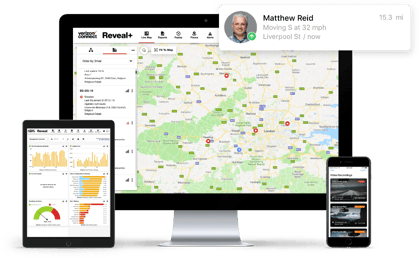Fleet Management for the Construction Industry 2023
See how fleet management technologies transform the construction Industry
Read moreThe theft of assets, equipment and vehicles, whether powered or non-powered, is a growing concern. According to the Chartered Institute of Building in the UK, “it is estimated that the construction industry suffers a loss of more than £400 million a year due to vandalism and theft”. (1).
Regarding stolen equipment, “once equipment has left the UK it becomes very difficult to locate and repatriate”. According to CESAR (the UK’s Official Construction Equipment Security and Registration Scheme), “as little as 5% of unregistered plant is recovered”. (2).
Additionally, it is not just the construction sector that suffers from thefts of equipment and assets. According to the police plant theft unit, Agriculture & Construction Equipment (ACE), there has been a peak in incidents of theft across the majority of machine types in the last few years. (3).
Equipment, trailer and asset theft comes with a hefty price for fleet managers, making robust security measures and implementing effective tracking systems critical to mitigating losses. Implementing GPS asset tracking can support vehicle theft prevention programs and assist with vehicle recovery efforts when theft happens.
Fleet managers are responsible for keeping track of vehicles and drivers as well as the necessary equipment for daily operations and of course, the cargo. GPS asset tracker anti-theft devices can prove invaluable for fleets that manage a variety of trailers, equipment, vehicles and valuable assets. By using tamper-proof equipment asset trackers, fleet managers can remotely locate and manage valuable items like generators, equipment and other assets.A discreet GPS tracker for assets utilises a small, mountable battery-powered unit to monitor the location and status of equipment throughout the day. These also give fleet managers a greater depth of data in addition to their existing telematics system. Fleet managers can utilise equipment asset trackers to benefit their day-to-day operations by:
Furthermore, fleet managers can educate their drivers and field workers on some basic tips to help them reduce the likelihood of asset, cargo or vehicle theft. Vehicle theft can be prevented by following these steps:
Telematics, particularly GPS geofencing, can significantly aid in combating theft or unauthorised usage of powered and non-powered assets. Fleet managers can draw virtual boundaries around job sites, businesses, residences or any physical location on a map, allowing them to continuously track company assets and vehicles, and exit and entry into these locations. Improved location reporting and flexible ping rates provide valuable insights into the whereabouts and usage patterns of trailers, containers and other assets.
If assets or vehicles are being used outside of work hours or if equipment is taken to unauthorised locations, managers receive a near real-time alert. A customisable alert can be sent straight to a mobile device about activities like:
To enhance security for equipment that should remain stationary, like trailers or cargo, managers can create virtual perimeters around the equipment, triggering alerts whenever a piece of equipment is moved.
Learn more about how using Verizon Connect’s GPS tracking system to manage your powered and non-powered assets can help you keep your valuable assets safe while simplifying your day-to-day operations, positively impacting your bottom line.
As important as it is to protect against asset theft or unauthorised use, asset and vehicle tracking software can also act as a means to recover stolen equipment or vehicles. Asset trackers can act as a theft recovery device by providing near-real time location and are designed to be discreet to help reduce the likelihood of perpetrators tampering with them.
The near real-time alerts delivered from a GPS tracker for equipment allow fleet managers to notify the police of unauthorised use or suspicious movement as soon as possible — speeding up stolen asset recovery. Police can be quickly provided with critical applicable information, such as number plate details, vehicle identification number (VIN) or description.
Verizon Connect EAT is now available for Verizon Connect Fleet and Reveal for the United Kingdom, Ireland, France, Germany and Italy, and in Portugal only for Reveal.
With a focus on simpler installation and an enhanced user experience across asset-only and mixed fleet customers, the Verizon built EAT device is interoperable with a wide variety of assets, over-the-air upgradeable and secure by design. Key features:
Given today’s inflated insurance prices, keeping insurance costs under control is a key priority for businesses. Many major insurance companies may provide a discount for having a GPS tracking system in place.
Using GPS asset tracking to help mitigate theft and potentially increase the likelihood of stolen asset recovery can help reduce total loss claims – saving both you and the insurance company money, improving your bottom line.
To get a detailed walkthrough of how asset tracking technology can benefit your organisation, schedule a demo today.
[1] EAT battery lasts approximately 7000 pings, or 5 years at 4 pings per day; EAT-B lasts approximately 14,000 pings, or 10 years at 4 pings per day. Battery life is estimated for use under optimal conditions. Factors such as low network signal strength, obstacles and temperature can reduce battery life.
Tags: Safety




Find out how our platform gives you the visibility you need to get more done.
See how fleet management technologies transform the construction Industry
Read moreGPS tracking devices for trailer fleets can help reduce theft, protect your cargo and enhance asset utilisation. Discover...
Read moreGPS vehicle tracking devices can help protect you from vehicle theft and increase vehicle recovery. Learn more about immobilisation...
Read moreAsset monitoring solutions are very advantageous for the construction industry. Keep reading to find out why.
Read more